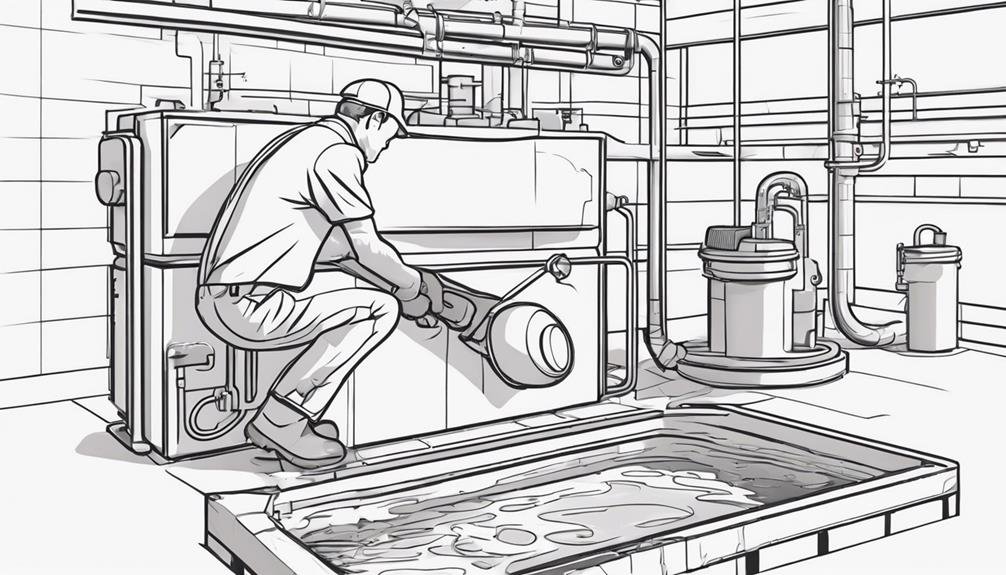Just like a well-oiled machine that requires regular maintenance to function smoothly, your commercial grease trap also needs proper care to avoid costly issues.
As a business owner, ensuring your grease trap is clean and functioning optimally is crucial for a seamless operation. By following expert tips tailored to your specific needs, you can prevent potential hazards and keep your establishment running efficiently.
Understanding the signs that indicate when your grease trap needs attention is the first step towards maintaining a healthy and functional kitchen environment.
Key Takeaways
- Regular maintenance prevents costly issues and ensures efficient operation.
- Determine cleaning frequency based on operational demands.
- Utilize high-pressure hot water jets and specialized degreasers for effective cleaning.
- Educate kitchen staff on proper grease disposal practices to maintain trap efficiency.
Importance of Regular Maintenance

Regular maintenance of your commercial grease trap is crucial to prevent costly issues and ensure efficient operation. By performing regular maintenance, you can reap a multitude of benefits. The frequency at which you service your grease trap directly impacts its overall performance and longevity. A well-maintained grease trap functions optimally, preventing clogs, foul odors, and potential backups in your plumbing system.
Neglecting maintenance can lead to costly problems down the line, such as blockages that may require professional intervention, resulting in higher maintenance costs.
Furthermore, the cost of maintenance is significantly lower compared to the expenses incurred when dealing with issues arising from neglected grease traps. Routine maintenance involves simple tasks like grease trap cleanings and inspections, which can be scheduled at convenient intervals. By investing in regular maintenance, you not only save on repair costs but also ensure that your grease trap operates smoothly, allowing your commercial kitchen to function efficiently without unexpected disruptions.
Signs Your Grease Trap Needs Cleaning
To determine if your commercial grease trap needs cleaning, watch out for specific indicators that signal potential build-up and blockages in the system. Here are some warning signs to look out for:
- Slow Drainage: If you notice that water is draining slower than usual in sinks or floor drains connected to the grease trap, it could be a sign of grease accumulation causing a blockage.
- Foul Odors: Unpleasant smells emanating from the drains or around the grease trap area may indicate the presence of rotting food particles and grease that need to be removed.
- Visible Grease Build-Up: When inspecting the grease trap, if you see a visible layer of grease or solid waste floating on top of the water, it's a clear sign that the trap is due for cleaning.
If you observe any of these signs, it's essential to address the issue promptly to prevent further complications. While some DIY solutions exist, it's often best to seek professional help to ensure thorough cleaning and proper maintenance of your grease trap.
Choosing the Right Cleaning Frequency

Considering the operational demands of your establishment, determining the appropriate frequency for cleaning your commercial grease trap is crucial for maintaining efficiency and compliance with regulations. Frequency evaluation is key in ensuring that your grease trap operates effectively. Cleaning intervals depend on various factors such as the size of your grease trap, the volume of grease and food particles it handles daily, and the type of activities in your kitchen.
To establish the right cleaning frequency, assess the amount of grease buildup in your trap regularly. Keep track of how quickly it accumulates and use this information to adjust your cleaning schedule. Typically, establishments like restaurants may require cleaning every 1-3 months, while high-volume kitchens might need more frequent cleaning, possibly every month. On the other hand, smaller establishments could extend their cleaning intervals to every 3-6 months.
Professional Cleaning Techniques
Implementing thorough and specialized techniques is essential for ensuring the effective cleaning of commercial grease traps. When it comes to professional grease trap cleaning, the following are key aspects to consider:
- Grease Removal Techniques: Utilize high-pressure hot water jets to break down and remove stubborn grease buildup. Incorporating specialized degreasers can further aid in the emulsification of fats, oils, and grease (FOG) for easier removal.
- Professional Equipment: Invest in powerful vacuum equipment designed specifically for grease trap cleaning to ensure thorough extraction of FOG and solid waste. This equipment helps in achieving a deep clean that manual methods mightn't achieve.
- Proper Disposal Methods, Environmental Impact: Dispose of the extracted waste at approved facilities that can process it safely. Improper disposal can lead to environmental pollution and legal ramifications. By adhering to proper disposal methods, you contribute to environmental sustainability and mitigate potential harm to ecosystems.
Preventative Maintenance Tips

For effective maintenance of your commercial grease trap, establishing a regular preventative maintenance schedule is crucial to prevent costly issues and ensure optimal functionality. To prevent grease buildup, implementing best practices is essential. Firstly, regularly inspect the grease trap for any signs of buildup and remove it promptly to prevent clogs and foul odors. Additionally, consider using bacterial additives to help break down grease and prevent solid accumulation in the trap.
When it comes to DIY maintenance, there are several helpful tips to keep your grease trap in top condition. One effective method is to regularly clean the inlet and outlet pipes to prevent blockages and ensure smooth flow. Furthermore, scraping off grease from dishes and cookware before washing them can significantly reduce the amount of grease entering the trap, minimizing the risk of buildup. Lastly, educating kitchen staff on proper grease disposal practices can go a long way in maintaining a clean and efficient grease trap.
Frequently Asked Questions
Can I Clean My Grease Trap Myself, or Do I Need to Hire a Professional?
You can clean your grease trap yourself; however, for complex systems or large amounts of grease, hiring a professional is recommended. DIY cleaning is suitable for routine maintenance, but professional help ensures thorough cleaning and compliance with regulations.
How Often Should I Have My Grease Trap Inspected for Potential Issues?
To keep your grease trap running smoothly, don't wait for the storm to hit before battening down the hatches. Regularly schedule inspections every 3 months to catch and prevent issues. Be proactive for peace of mind.
Are There Any Regulations or Guidelines I Need to Follow When It Comes to Grease Trap Cleaning?
When it comes to grease trap cleaning, it's crucial to adhere to compliance requirements and best practices. Proper disposal is essential to minimize the environmental impact. Following regulations ensures a smoothly running operation while safeguarding the environment.
What Are Some Common Mistakes People Make When Maintaining Their Grease Trap?
Maintaining your grease trap requires vigilance. Common pitfalls include neglecting regular pump-outs, using harsh chemical cleaners, and improper installation. Avoid these maintenance mistakes to ensure a properly functioning grease trap and compliance with regulations.
How Can I Extend the Lifespan of My Grease Trap and Prevent Costly Repairs?
To extend your grease trap's lifespan and avoid costly repairs, practice preventative maintenance by using grease trap additives. Proper disposal of FOG (fats, oils, grease) and regular cleaning will prevent odors and keep your system running smoothly.
Conclusion
In conclusion, ensuring regular maintenance of your commercial grease trap is crucial for the smooth operation of your business. By following expert tips for cleaning and maintenance, you can prevent costly repairs and ensure a clean and efficient system.
Remember, neglecting your grease trap is like ignoring a ticking time bomb – take action now to avoid a messy and expensive disaster down the line. Your business depends on it.

